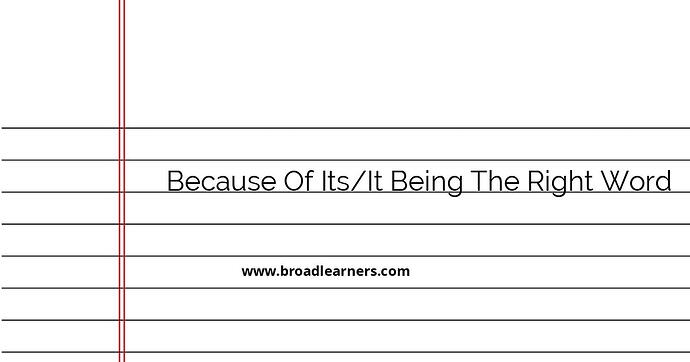Choosing between 'because of its' and 'because of it being' can be challenging for English learners and even native speakers. Both phrases are grammatically correct, but they serve different purposes and contexts. In this guide, we will explore the differences between these two expressions, when to use each one, and provide examples for clarity.
Understanding the Basics
- 'Because of its'
- This phrase is used to indicate a reason or cause related to a condition or quality inherent to the subject or object, often followed by a noun or noun phrase.
- 'Because of it being'
- This expression is utilized when the focus is on an action or state of being. It is often followed by a past participle or adjective to describe the situation.
1. Using 'Because of Its'
'Because of its' is more commonly used to attribute a reason to a noun. The noun that follows 'its' is the owner or instigator of the action or quality.
Example:
The park was closed because of its environmental importance.
Explanation: In this example, 'its' refers to the park's environmental importance, which is the reason for its closure.
2. Using 'Because of It Being'
'Because of it being' is often used when you want to stress an ongoing state or action rather than a noun.
Example:
The meeting was postponed because of it being scheduled on a holiday.
Explanation: Here, 'it being scheduled on a holiday' highlights the action/state as the cause for the meeting's postponement.
When to Use Each?
- Use 'because of its' when you wish to specify a characteristic, attribute, or element related directly to a noun.
- Use 'because of it being' when focusing on the specific action or condition affecting the event or situation.
Additional Examples:
Using 'Because of Its'
- Example: The book was popular because of its compelling narrative.
Explanation: 'Its' refers to the book's narrative, which is the cause of its popularity. - Example: The project failed because of its poor planning.
Explanation: 'Its' refers to the project's planning, attributing this as the reason for failure.
Using 'Because of It Being'
- Example: The road was closed because of it being under construction.
Explanation: 'It being under construction' highlights the ongoing action as the reason for closure. - Example: The product was recalled because of it being defective.
Explanation: 'It being defective' refers to the condition of the product, giving the reason for the recall.
Understanding the subtle nuances between these expressions will enhance your precision and clarity in communication. Remember, both phrases are correct, but context and intent play crucial roles in deciding which one to use.
Did I miss anything? Respond below
